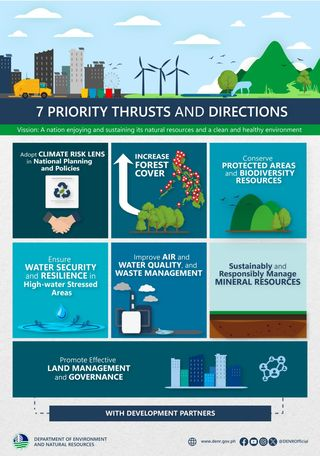
- Adopt climate-risk lens in national planning and policies
-
- Promote convergence and policy coherence among national government agencies
- Operationalize the Geospatial Database Office to develop the National Natural Resources Geospatial Database
- Natural Capital Accounting and Valuation of Ecosystem Services
- Institute risk-based ecosystem management and nature-based solutions
- Invest in green opportunities by implementing Sustainable Finance Roadmap
Among the reforms implemented by the department is the adoption of a climate-risk lens in planning and policy formulation. This led to the establishment of a National Geospatial Database for natural resources which provides the integration of climate-related and geospatial data for risk-informed planning, policy and decision-making. The Geospatial Database Office catalogs our natural resources including land, forests, water and minerals using satellite images and drones to survey natural and man-made changes within our islands.
- Increase forest cover
-
- Intensify forest protection and anti-illegal logging
- Identify and map priority areas for reforestation and other forestry investments
- Conserve protected areas and biodiversity resources
-
- Develop and manage Protected Areas
- Manage coastal and marine resources
- Strengthen Marine Protected Areas (MPAs) and establish MPA networks as
- key tools to support Blue Economy
- Conserve and protect wildlife resources
- Improve air and water quality, and waste management
-
- Strengthen enforcement and monitoring of air quality and water quality standards
- Promote circular economy, stimulate sustainable consumption and production, implement the National Program of Action on Marine Litter
- Implement the Extended Producers’ Responsibility (EPR) Law
- Provide technical assistance on solid waste management, including toxic and hazardous wastes
- Ensure water security and resilience in high-water stressed areas
-
- Implement integrated water resources management
- Improve water resources monitoring and assessment, measurement and data availability
- Reduce groundwater depletion
- Mobilize financing for water-resilient infrastructure projects
- Employ water conservation measures such as use of rainwater harvesting facilities
- Sustainably and responsibly manage mineral resources
-
- Implement sustainable mineral resources development
- Promote the development of critical minerals, processing and value-adding
- Intensify compliance monitoring and enforcement of environmental safeguards in mining operations including effective social development management programs
- Promote effective land management and governance
-
- Implement the National Land Title Program to facilitate issuance of patents
- Digitization and modernization of land information management systems
- Implement sustainable land management and governance for the remaining undistributed lands












